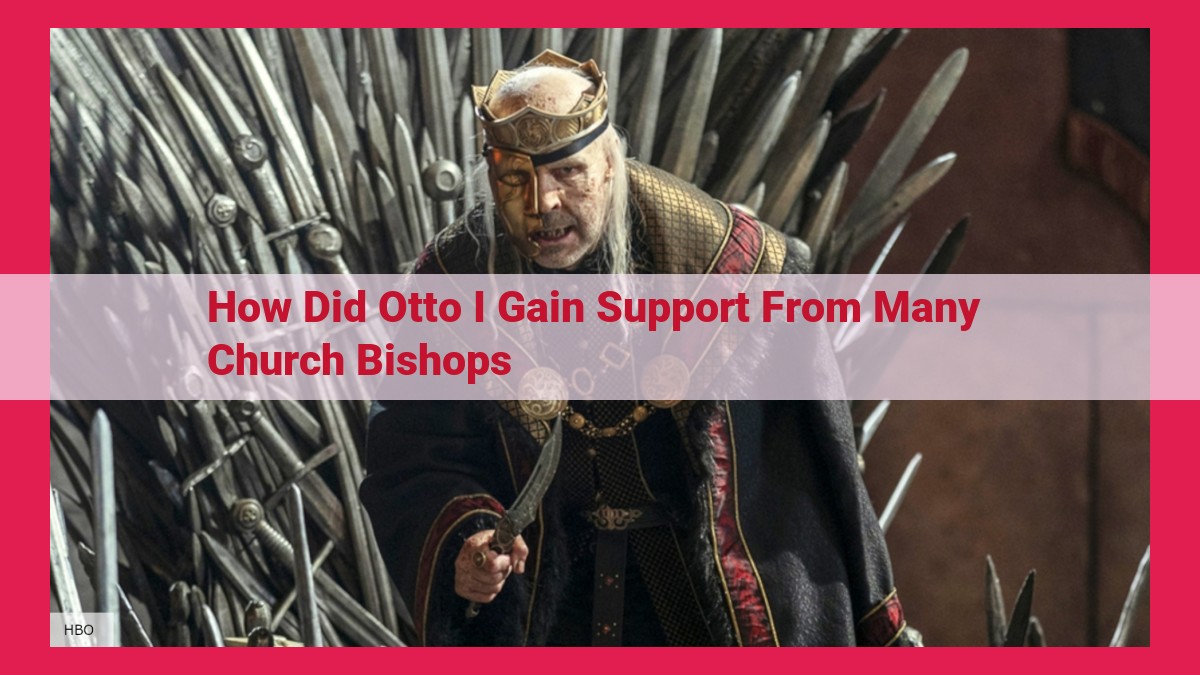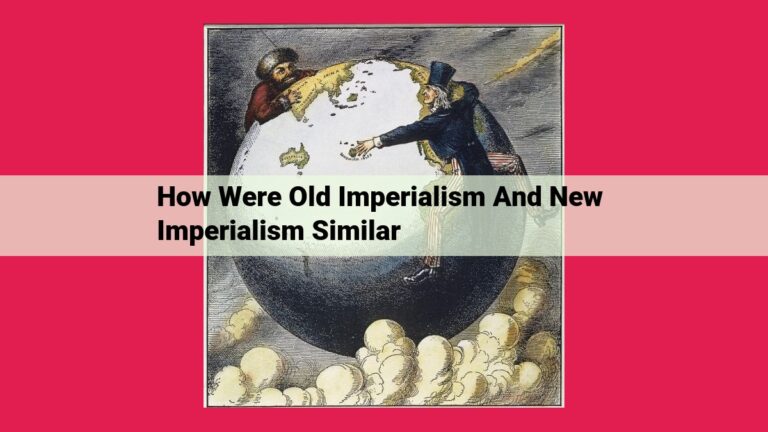Otto I’s Strategic Alliance With The Papacy And Influence Over The Church

Otto I gained support from many church bishops by forming an alliance with the papacy through the Concordat of Worms, which granted him influence over papal elections. His victory over the Magyars at the Battle of Lechfeld established him as a strong defender of Christendom, enhancing his reputation and influence with bishops. Otto also granted privileges to bishops, establishing “Imperial Bishops” with secular power. His support for church reforms, such as the Cluniac Reforms and Pope Gregory VII’s “Dictatus Papae,” further strengthened his alliance with the papacy and gained him the support of high-ranking church officials.
Otto’s Alliance with the Papacy
- Explain the Concordat of Worms and how it gave Otto influence over papal elections.
- Discuss the Investiture Controversy and how Otto’s alliance with the papacy strengthened his power.
Otto I: Forging an Unbreakable Bond with the Papacy
In the annals of European history, Otto I, crowned as the first Holy Roman Emperor in 962, looms as a towering figure whose reign marked a profound transformation in the relationship between the Holy Roman Empire and the Papacy. Through a series of strategic alliances and ecclesiastical reforms, Otto forged an unbreakable bond with the Church, a bond that would shape the political and religious landscape of Europe for centuries to come.
The Concordat of Worms and Papal Elections
Otto’s alliance with the Papacy began with the momentous Concordat of Worms in 1122. This agreement granted Otto the right to influence papal elections, significantly enhancing his power and control over ecclesiastical affairs. The Concordat established a system whereby the German king had a major voice in the selection of the pope, a privilege that had been previously held by Byzantine emperors. This arrangement solidified Otto’s authority and ensured the close collaboration between the Empire and the Papacy.
The Investiture Controversy and Strengthening Imperial Power
The Investiture Controversy, a long-standing conflict between the Papacy and the Holy Roman emperors, further strengthened Otto’s alliance with the Church. In the 11th century, emperors claimed the right to invest bishops with their temporal power through a ceremony known as investiture. However, the Papacy asserted that only the Church had the authority to appoint bishops. Otto’s support for the Papal cause earned him the unwavering loyalty of the Church and solidified his position as a stalwart defender of Christian Europe.
Otto’s Triumphant Victory Over the Magyars
The Battle of Lechfeld: A Defining Moment
In the year 955 CE, the fate of Christian Europe hung in the balance as the fierce Magyar hordes swept into the heart of Germany. Under the leadership of the enigmatic Bulcsú, these nomadic warriors had terrorized the countryside for decades. But their reign of destruction was about to come to an end.
As the Magyars approached the Lech River near Augsburg, they encountered a formidable force led by the young Saxon king, Otto I. Otto, known as Otto the Great, had risen to prominence after being crowned King of the East Franks in 936. Determined to protect his realm and uphold the Christian faith, Otto assembled a coalition of Frankish and Swabian warriors.
On August 10, 955, the two armies clashed in an epic battle that would forever etch Otto’s name in the annals of history. The Magyars, known for their swift and devastating raids, unleashed a torrent of arrows upon the Frankish lines. However, Otto’s heavy cavalry proved too powerful for the Magyar horsemen.
As the battle raged, Otto rode through the ranks of his warriors, inspiring them with his unwavering courage and determination. The superior tactics and discipline of the Frankish knights turned the tide in their favor. Bulcsú and his warriors were routed, and their dreams of conquest shattered.
A Hero’s Role and Imperial Glory
The Battle of Lechfeld was a watershed moment in Otto’s reign. His victory earned him the title of “Defender of Christendom” and cemented his reputation as a formidable warlord. It also marked a turning point in the history of Europe, as the Magyar incursions were halted and the borders of Christian Europe were secured.
Otto’s triumph at Lechfeld had a profound impact on his relationship with the bishops and other ecclesiastical leaders. His role as the first emperor of the Holy Roman Empire, crowned by Pope John XII in 962, enhanced his authority and prestige. Bishops and abbots throughout the empire recognized Otto’s power and sought his favor. By granting them privileges and influence, Otto forged strong alliances with the Church, which further bolstered his position as the dominant force in Europe.
Otto’s Alliance with the Papacy: A Strategic Partnership
In the 10th century, the Holy Roman Emperor, Otto I, sought to consolidate his power and unite his vast empire under the banner of Christianity. His alliance with the papacy proved crucial in achieving these goals.
The Concordat of Worms, negotiated in 1122, granted Otto significant influence over papal elections. This agreement gave him the right to confirm the election of new popes and to depose those who were deemed unfit. This partnership not only strengthened Otto’s authority but also solidified the unity of the Western Church under his leadership.
The Investiture Controversy, which arose in the 11th century, further strengthened Otto’s alliance with the papacy. The controversy centered on the question of who had the right to appoint bishops: the emperor or the pope. Otto’s support for the papal position against the claims of the German nobility further solidified his role as a defender of the Church.
Imperial Bishops: An Extension of Secular Power
Otto played a pivotal role in elevating the status of bishops within his empire. He granted them significant secular power and influence, creating the concept of “Imperial Bishops.” These bishops not only held ecclesiastical authority but also governed vast territories and commanded armies. This arrangement allowed Otto to extend his control over both religious and secular matters, creating a cohesive and centralized empire.
Otto’s support for church reforms, including the Gregorian Reforms, also strengthened his alliance with the papacy. The Gregorian Reforms, championed by Pope Gregory VII, sought to purify the Church by enforcing clerical celibacy, limiting simony (the buying and selling of church offices), and establishing papal supremacy. Otto’s endorsement of these reforms won him the support of high-ranking church officials, further cementing his alliance with the papacy.
In essence, Otto’s granting of privileges to bishops and his support for church reforms were strategic moves that solidified his power, strengthened his alliance with the papacy, and ensured the unity of his empire. This shrewd political maneuvering left an enduring legacy on the relationship between the Holy Roman Emperors and the Church, shaping the course of European history for centuries to come.
Otto’s Enduring Legacy: Support for Church Reforms
Otto I, the formidable ruler of the Holy Roman Empire, played a pivotal role in shaping the destiny of both church and state. His unwavering support for ecclesiastical reforms cemented his alliance with the papacy and left an indelible mark on the medieval ecclesiastical landscape.
Embracing the Cluniac Movement
Otto I was a fervent supporter of the burgeoning Cluniac Reforms, a movement that sought to purify the clergy and strengthen papal authority. Inspired by the teachings of the Benedictine reformers, Cluniac monasteries emphasized strict adherence to vows of celibacy and obedience to the pope. Otto’s patronage of these reforms not only elevated the moral authority of the church but also fortified his own standing as a champion of Christian values.
The “Dictatus Papae”: A Papal Proclamation
Otto’s unwavering support for the papacy reached its zenith with his endorsement of Pope Gregory VII’s audacious papal bull, the “Dictatus Papae.” This revolutionary document asserted the pope’s supreme authority over all earthly rulers, positioning him as the undisputed head of Christendom. By aligning himself with Gregory VII’s bold vision, Otto not only further strengthened his alliance with the church but also solidified his control over ecclesiastical affairs.
Through his unwavering support for church reforms, Otto I cemented his legacy as a pivotal figure in medieval history. His unwavering devotion to the papacy and his unwavering defense of Christian principles left an enduring mark on the ecclesiastical and political landscape of Europe.





